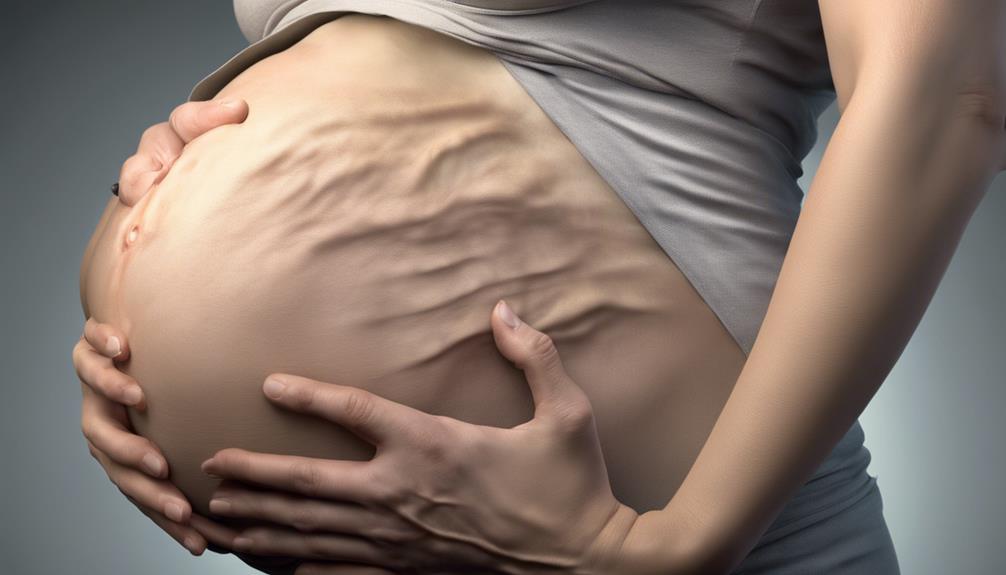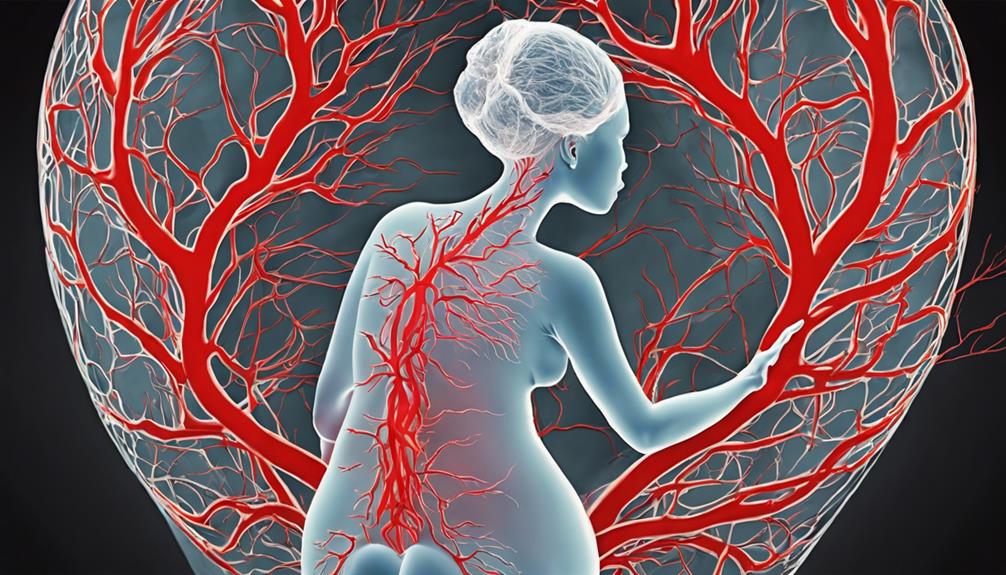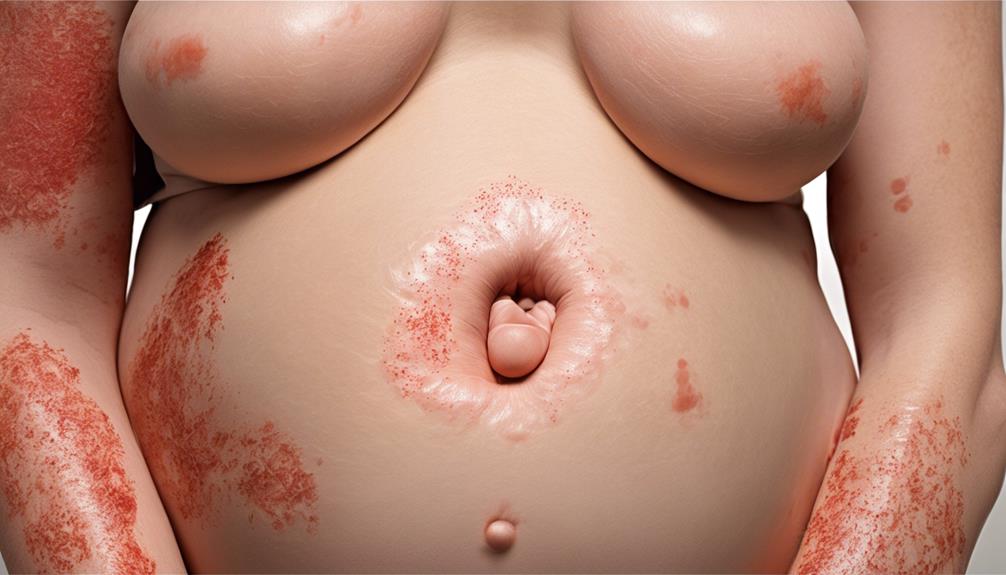During the second trimester of pregnancy, it is common to experience cramping that may be worrisome. However, knowing the seven potential causes of these cramps can provide reassurance and peace of mind during this crucial period.
It's important to recognize that while some cramping is normal, there are specific factors that could warrant a closer look. Stay tuned to uncover the mysteries behind these cramps and how to navigate them with confidence.
Key Takeaways
- Round ligament pain and Braxton Hicks contractions are common causes of cramping in the second trimester.
- Dehydration and digestive issues like constipation can exacerbate cramping during pregnancy.
- Increased blood flow to the uterus and hormonal changes contribute to cramping discomfort.
- Proper hydration, posture, and gentle movements are key in managing cramping in the second trimester.
Round Ligament Pain
In the second trimester, our bodies may experience round ligament pain as a common cause of cramping due to the stretching and pulling of the ligaments that support the uterus. This discomfort, often characterized by sharp pain in the lower abdomen, can catch us off guard, particularly during sudden movements like sneezing or coughing. The sensation of round ligament pain, while intense, is usually brief, subsiding as the ligaments adapt to the expanding uterus.
To alleviate round ligament pain, incorporating gentle stretching exercises into our routine can help ease the tension in the ligaments. Changing positions slowly and using maternity support belts can also provide additional support to the abdomen, reducing the strain on the ligaments. These measures contribute to a more comfortable experience during this phase of pregnancy.
Braxton Hicks Contractions
Experiencing Braxton Hicks contractions during the second trimester is a common occurrence for pregnant individuals, as these practice contractions play an important role in preparing the uterus for labor. These contractions are typically felt as tightening or squeezing sensations in the abdomen. They are irregular, usually painless, and do not cause cervical dilation. Triggers for Braxton Hicks contractions can include dehydration, physical activity, or having a full bladder. These contractions are a normal part of pregnancy and serve as a way for the uterus to practice for the upcoming labor and delivery.
| Braxton Hicks Contractions | Description | Triggers |
|---|---|---|
| Sensation | Tightening or squeezing in the abdomen | Dehydration |
| Regularity | Irregular, not rhythmic | Physical activity |
| Pain Level | Usually painless | Full bladder |
Dehydration
Dehydration is a critical factor that can lead to cramping in the second trimester. Insufficient water intake can disrupt electrolyte balance, impacting muscle function and potentially causing cramps.
To prevent dehydration during pregnancy, it's important to guarantee adequate fluid intake and watch for common dehydration symptoms.
Common Dehydration Symptoms
Pregnant individuals may notice common symptoms such as dark yellow urine, dry mouth, headaches, and dizziness, indicating the possibility of dehydration. During pregnancy, women have increased fluid needs to support both themselves and their baby, putting them at higher risk for dehydration.
Dehydration in pregnant women can lead to complications like urinary tract infections, constipation, and even preterm labor. To prevent dehydration, it's important to monitor urine color and frequency regularly. Drinking plenty of water and electrolyte-rich fluids throughout the day is essential.
Maintaining proper hydration levels is important for the health and well-being of both the mother and the developing baby, helping to prevent potential risks associated with dehydration during pregnancy.
Preventing Dehydration During Pregnancy
Monitoring fluid intake and recognizing early signs of dehydration are essential practices for pregnant individuals to prevent potential complications during the second trimester.
Dehydration can lead to cramping and discomfort, impacting the overall well-being of the mother and the baby. To prevent dehydration, it's important for pregnant individuals to consume at least 8-10 glasses of water daily.
Signs of dehydration include dark yellow urine, dry mouth, dizziness, and fatigue. In addition to discomfort, dehydration during pregnancy increases the risk of urinary tract infections and preterm labor.
Adequate hydration plays a significant role in maintaining amniotic fluid levels and supporting maternal health. Prioritizing water intake is important for a healthy pregnancy and can help alleviate various risks associated with dehydration.
Urinary Tract Infection (UTI)

Experiencing pain or burning during urination could indicate the presence of a urinary tract infection (UTI) in the second trimester of pregnancy. UTIs are common during pregnancy and can lead to cramping in the lower abdomen, pelvic pressure, and discomfort. Symptoms such as foul-smelling urine and increased frequency of urination are warning signs of a possible UTI. It is vital to seek prompt medical treatment for UTIs to prevent complications like preterm labor.
| Symptoms of UTIs in Pregnancy | Effects on the Body | Importance of Treatment |
|---|---|---|
| Pain or burning during urination | Discomfort and irritation | Prevent complications |
| Foul-smelling urine | Indicator of infection | Avoid preterm labor |
| Increased frequency of urination | Disruption of daily life | Ensure maternal health |
| Pelvic pressure | Added discomfort | Maintain pregnancy health |
| Cramping in lower abdomen | Physical strain | Ensure fetal well-being |
Gastric Distress

Gastric distress commonly arises in the second trimester of pregnancy due to elevated progesterone levels, leading to symptoms like gas, bloating, and constipation. During this stage, the increased progesterone levels slow down digestion, causing gastrointestinal discomfort such as cramping.
To alleviate gastric distress in the second trimester, consider the following:
- Incorporate fiber-rich foods into your diet to promote healthy digestion.
- Stay hydrated to help soften stools and ease constipation.
- Use stool softeners as recommended by your healthcare provider to relieve constipation.
- Passing gas or having a bowel movement can provide relief from gastric discomfort.
- Avoid foods that may exacerbate bloating and gas, such as fried or fatty foods.
Increased Blood Flow to the Uterus

During the second trimester of pregnancy, the increased blood flow to the uterus plays a crucial role in causing cramping sensations as the body supports the developing baby. As the pregnancy progresses, the uterus requires more blood to nourish and oxygenate the growing baby. This heightened circulation leads to the expansion and contraction of the uterus, which can result in cramping discomfort for expectant mothers. The increased blood flow not only delivers essential nutrients to the fetus but also triggers mild cramping episodes due to the uterus's constant activity in accommodating the baby's development.
The body's natural response to pregnancy involves enhancing circulation to meet the demands of the growing fetus. This process is essential for ensuring that the baby receives all the necessary components for healthy growth. By understanding the role of increased blood flow in the uterus, expectant mothers can better comprehend the occasional cramping experienced during the second trimester. Proper awareness and knowledge about this aspect of pregnancy can help individuals manage cramping episodes effectively and alleviate any concerns they may have.
Other Potential Causes

While round ligament pain, gas, bloating, and constipation are common culprits of cramping in the second trimester, there are also lesser-known triggers and uncommon underlying issues that may contribute to this discomfort.
These factors can vary from person to person and may require medical evaluation to determine the specific cause of cramping during pregnancy.
Understanding these other potential causes can help pregnant individuals better manage their symptoms and seek appropriate care when needed.
Lesser-Known Triggers
Cramping in the second trimester can also be triggered by lesser-known factors beyond round ligament pain and gas, such as dehydration and digestive issues. Dehydration, often underestimated, can play a significant role in causing cramps during this stage of pregnancy. Additionally, digestive issues like constipation can worsen cramping, emphasizing the importance of maintaining good bowel health.
Other triggers for cramping in the second trimester include increased blood flow to the uterus, which can exert pressure on nearby organs, leading to discomfort. It's important to stay mindful of these lesser-known triggers to help manage and alleviate cramping episodes effectively.
Uncommon Underlying Issues
Exploring beyond the more commonly recognized triggers, additional underlying issues may contribute to cramping in the second trimester of pregnancy. In some cases, gas and bloating from a slower digestive system can lead to discomfort. Dehydration, a common concern during pregnancy, can also play a role in causing cramps. Constipation, often exacerbated by hormonal changes, is another potential culprit. Additionally, the increased blood flow to the uterus as the baby grows can create pressure and result in cramping sensations. Ensuring these less talked about factors are addressed is crucial for a more comfortable second trimester experience.
| Underlying Issue | Description |
|---|---|
| Gas and Bloating | Slow digestion can lead to cramping. |
| Dehydration | Lack of fluids can contribute to discomfort. |
| Constipation | Hormonal changes can cause constipation-related cramps. |
| Increased Blood Flow | Pressure from increased blood flow may result in cramping. |
Frequently Asked Questions
Is It Normal to Have Cramps in Second Trimester?
Yes, it's common to experience cramps in the second trimester as the uterus expands. These cramps are usually due to ligament stretching or increased blood flow. If unsure, always consult a healthcare provider for guidance.
When Should I Be Concerned About Cramping While Pregnant?
When cramping while pregnant, we should be concerned if accompanied by contractions, bleeding, dizziness, or unusual discharge. Seek immediate medical attention for severe pain, heavy bleeding, or additional symptoms like shoulder or neck pain.
Why Am I Cramping so Much at 2 Weeks Pregnant?
We're cramping at 2 weeks pregnant due to ovulation or early changes in the uterus. It's normal because implantation hasn't happened yet. If severe or persistent cramping occurs, especially with other symptoms, seeking medical advice is wise.
Is It Normal to Have Period Like Cramps While Pregnant?
Yes, it's normal to experience period-like cramps during pregnancy. They can be due to the uterus stretching and increased blood flow. However, severe or persistent cramps should be evaluated by a healthcare provider to rule out complications.
Conclusion
To sum up, cramping during the second trimester of pregnancy is a common occurrence with various causes such as round ligament pain, dehydration, and Braxton Hicks contractions.
Remember, 'an ounce of prevention is worth a pound of cure.' Stay hydrated, practice relaxation techniques, and seek medical advice if cramping is severe or persistent.
Taking care of yourself and addressing any concerns promptly can help guarantee a healthy pregnancy for you and your baby.









